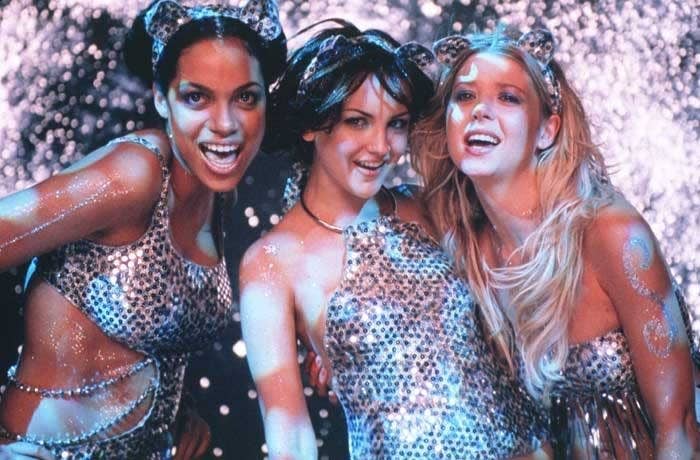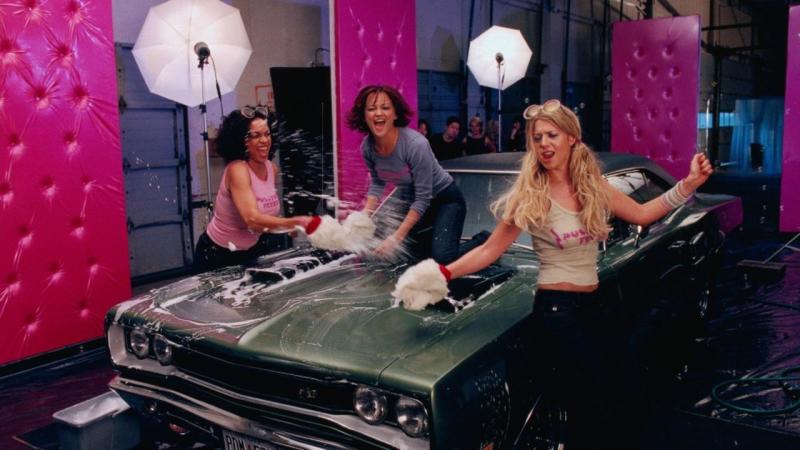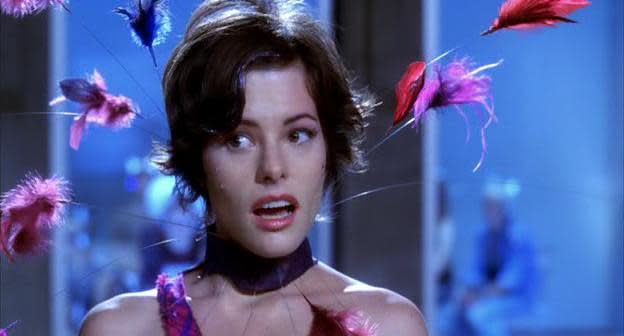
When I think about the very early aughts and the movies that meant most to me as a pre-teen, it comes down to 2000's Charlie's Angels and 2001's Josie and the Pussycats—(not) coincidentally both movies about three kick-ass women. On April 11, the latter turns 15 years old, and I'm convinced it's still one of the greatest movies of all time. It also has the greatest movie soundtrack of all time, with an addictive pop-punk prom queen anthem that I can sing every word to, to this very day. The film initially got lackluster reviews (with an unimpressive 53% Rotten Tomatoes ratings) and was brushed off as a stupid tween movie, but over the years—and especially now that those tweens have grown up—Josie and the Pussycats has been reclassified as something of a classic. And for good reason.
But just because it's newly certified doesn't mean its age doesn't show. Josie and the Pussycats is almost hilariously of its time. From the musical trends (the film's boy band Du Jour is basically a rip-off of Backstreet Boys/NSYNC) to TRL to the blue eyeshadow to the outrageously low waistlines of outrageously flared pants, a lot of things about Josie feel very outdated. Watching it in 2016, it really does feel like a corny time capsule in many ways. The movie was meta beyond Scream and made the kind of anti-corporation commentary that could only come from an era recovering from grunge. But even the cringe-worthy aspects of Josie and the Pussycats are gems, and that's before you even begin to consider its cast. Teen flick queen Rachel Leigh Cook (what are you up to now?); Rosario Dawson before her Daredevil days; young Tara Reid before... well, before everything; a Carson Daly cameo (who was then dating Tara Reid); Seth Green, Breckin Meyer, and Donald Faison as Du Jour members; Eugene Levy as himself; pre-Revenge Gabriel Mann as Josie's love interest; and, of course, Alan Cumming and Parker Posey as evil record execs looking to take over the world by brainwashing teens with subliminal messages in popular music. Ridiculous, all of it.

Most importantly, this was a movie about young women for young women. High off the era of '90s Riot Grrrls, Josie and the Pussycats focused on women who wanted to rock and just be really good friends with each other. Take away the insane plot of the whole subliminal brainwashing thing, wipe off some of—a lot of—the feather and glitter, and that's what it boils down to: friendship. The movie taught us about the priority of relationships over fame, money, or being "cool." As a young girl, it made me want to have, and keep, that kind of relationship with my own friends (and if you were in a tight-knit group of three like I was, then you also each assigned yourselves a Josie member).
The film, written and directed by Harry Elfont and Deborah Kaplan, easily passes the Bechdel Test before passing the Bechdel Test was really a thing. There's never really any sense of belittlement about The Pussycats' gender, and it never reflects on their ability to rock. Josie's love interest, Alan M (Gabriel Mann), is also a musician, but there's never a conflict of, "Why is this girl better and more famous than me?" As a viewer, you don't question it either. You also don't question the gender-bending dynamic of Josie fixing Alan's car. Yeah, the girl can rock. She also is a car mechanic. The relationship between Josie and Alan is cute, but it's never the central focal point of the movie, which is why I would never categorize Josie and the Pussycats as a rom-com. For Josie two other loves come first: 1) her friendships and 2) music.

There's another important kind of love that Josie preaches: self-love. There's a sweet moment at the end when Alan Cumming and Parker Posey take off their extremely trendy outfits, stop sucking in their waistlines and pretending. They just let themselves go: their chubby, albino, lisping selves. The Pussycats' manager Alexander says it best at the end of the movie when his sister asks if the moral of the movie is that "freaks should date other freaks." "No," he says. "I think the moral of the story is you should be happy with who you are." It's a weird scene, as Josie points out, but in that moment, the two have never been happier throughout the entire movie.
Of course, we could just talk about Parker Posey's Fiona for days, too. She's a woman in charge, a rare female movie villain who is complicated, forgiving, and who gets some sort of redemption at the end. She got into this mess because she was teased at school and wanted to, for once, be seen as the cool girl (bro, she's not just another power-hungry bitch). And even though she's arrested on charges of conspiracy at the end, she comes out a winner too. She finds a reason to love herself, and someone to love her.
The movie came out in those crucial years when I felt at my most awkward. Of course, I paled in comparison to Fiona's true self, but it was reassuring to watch when I was 10-going-on-11. I found something to love about myself even on the hardest days. Josie and the Pussycats also taught me as a young girl that as fading as fads are, friendships are forever, and that's something I shouldn't take for granted. Damn, that's a corny-ass thing to say. But Josie and the Pussycats is a corny-ass movie. A corny-ass movie that's sweet, fierce, and fun as hell. A corny-ass movie that I'll watch it over and over again for all of eternity.


